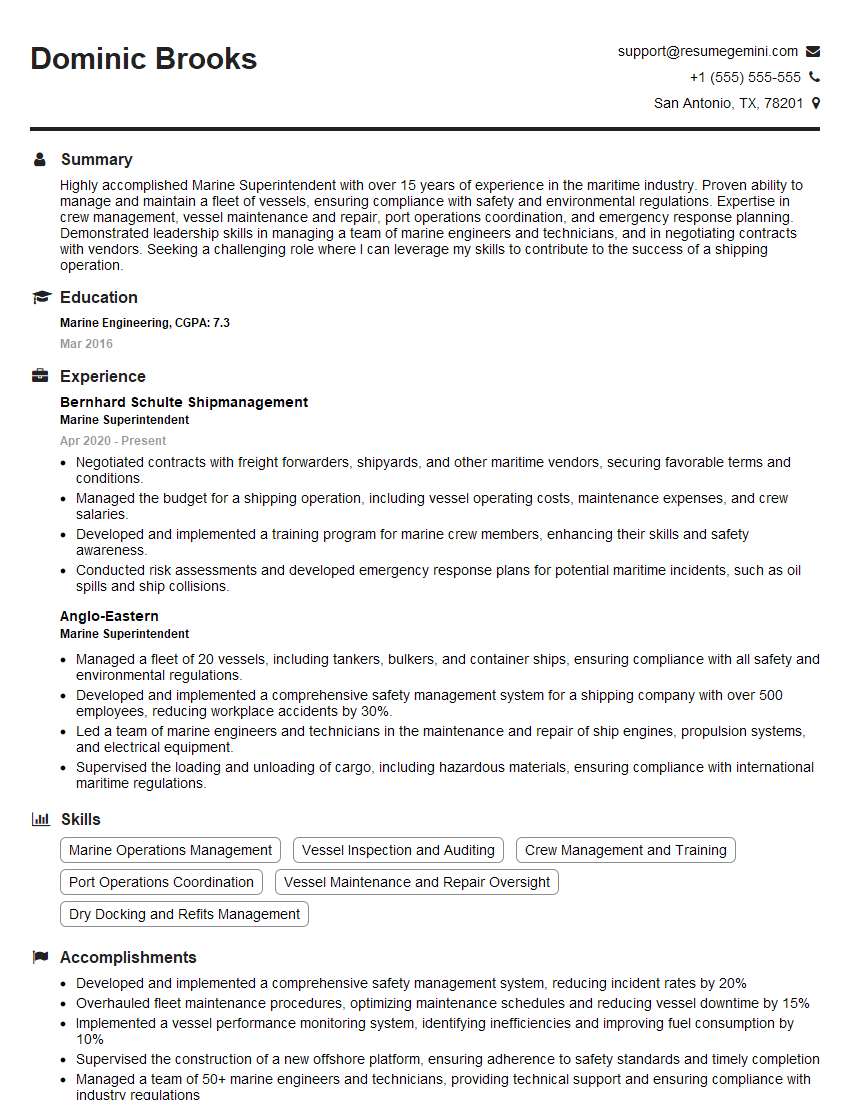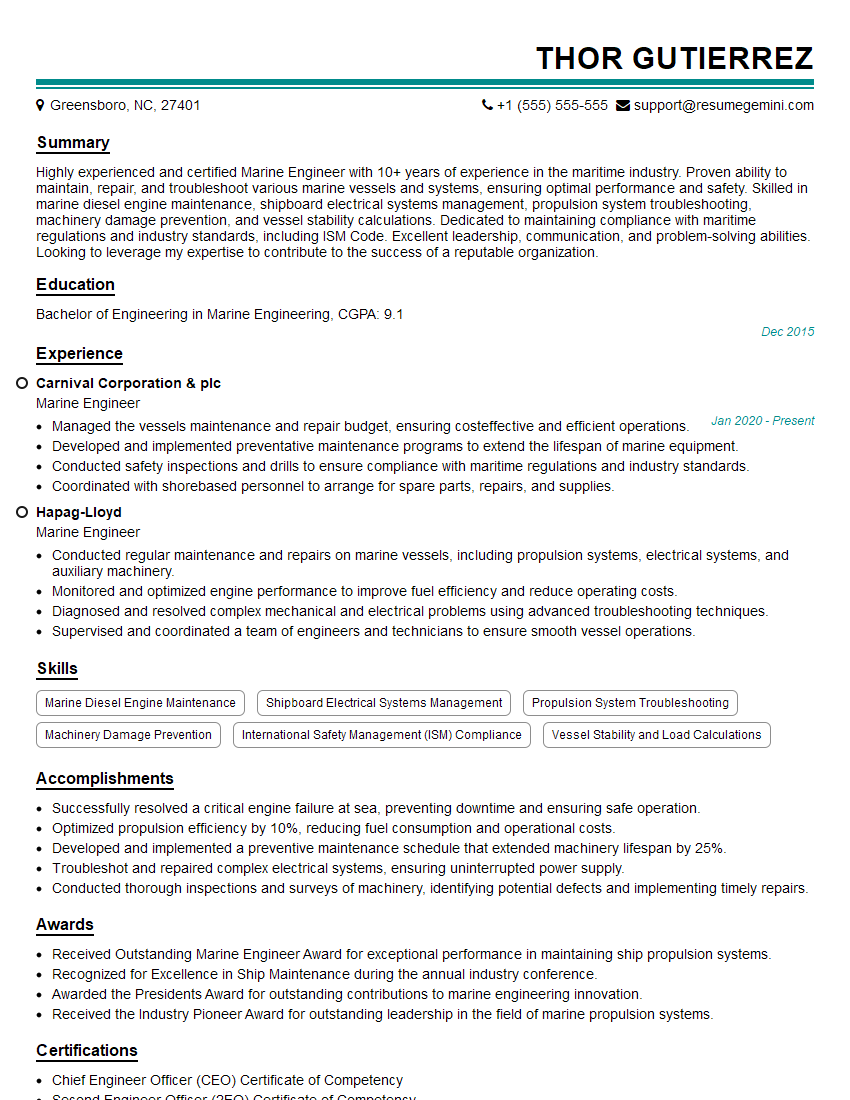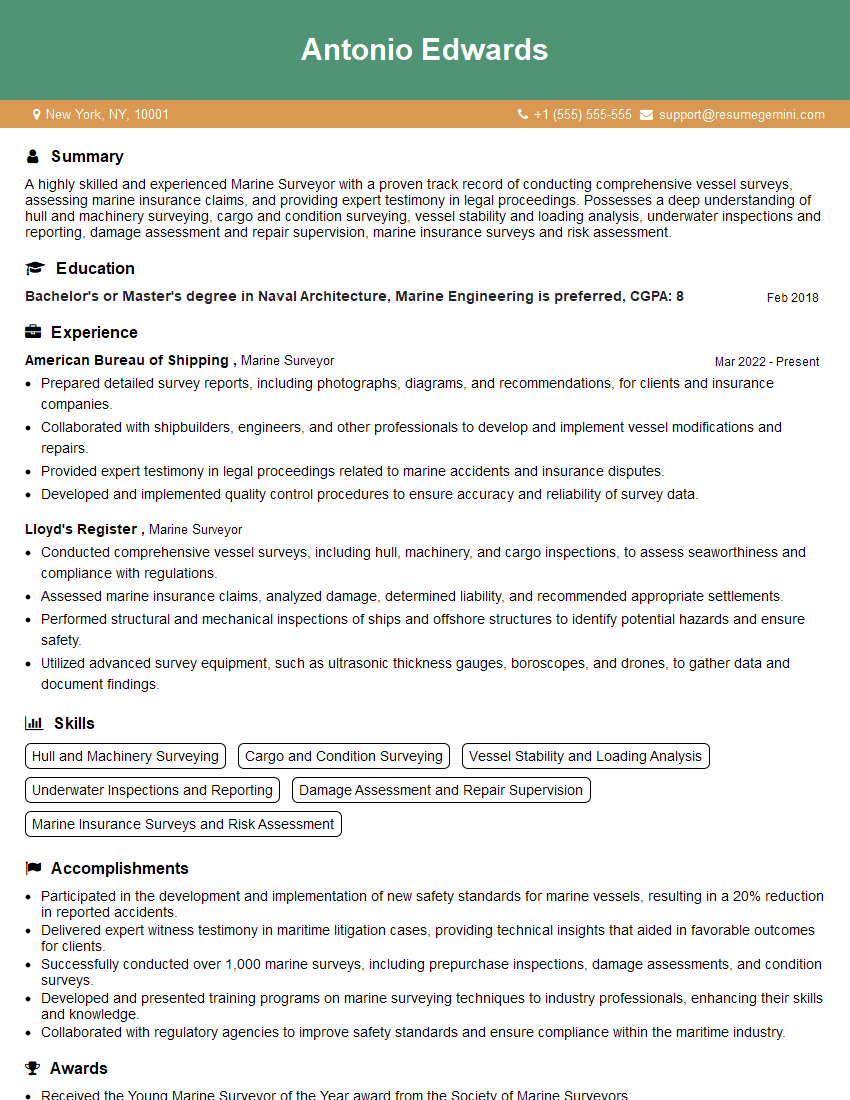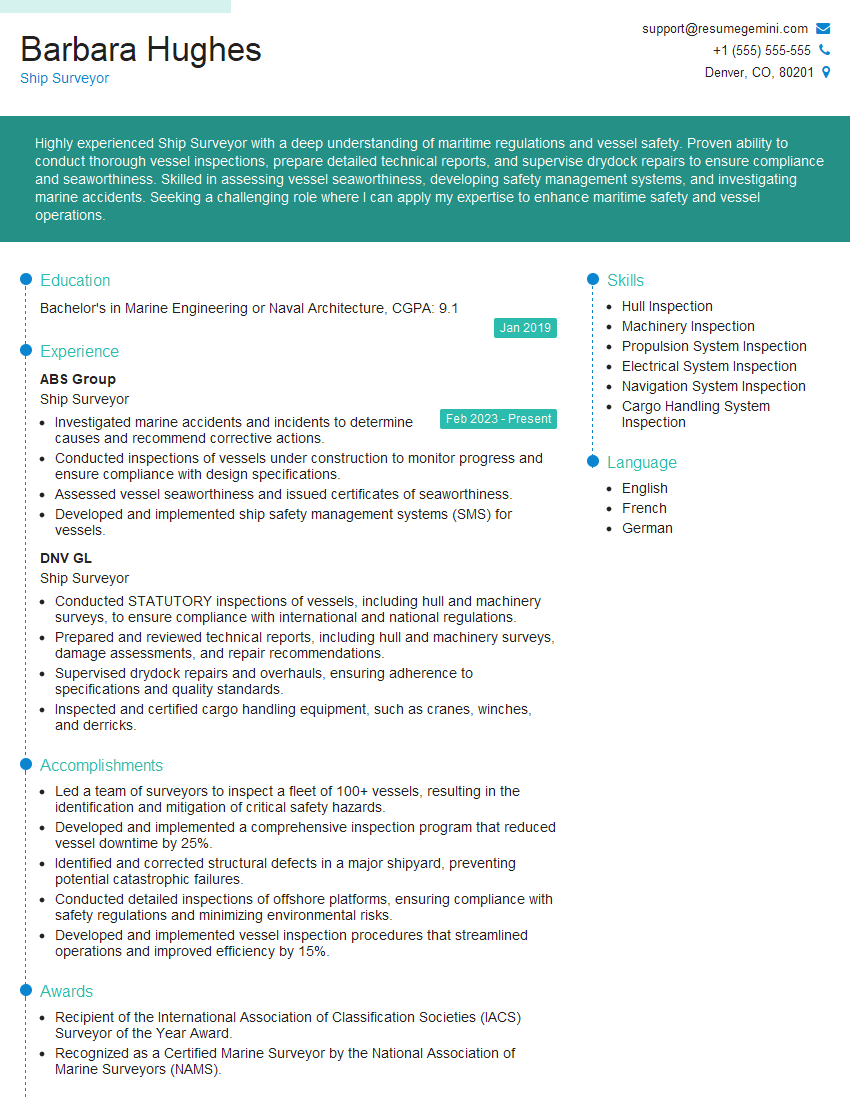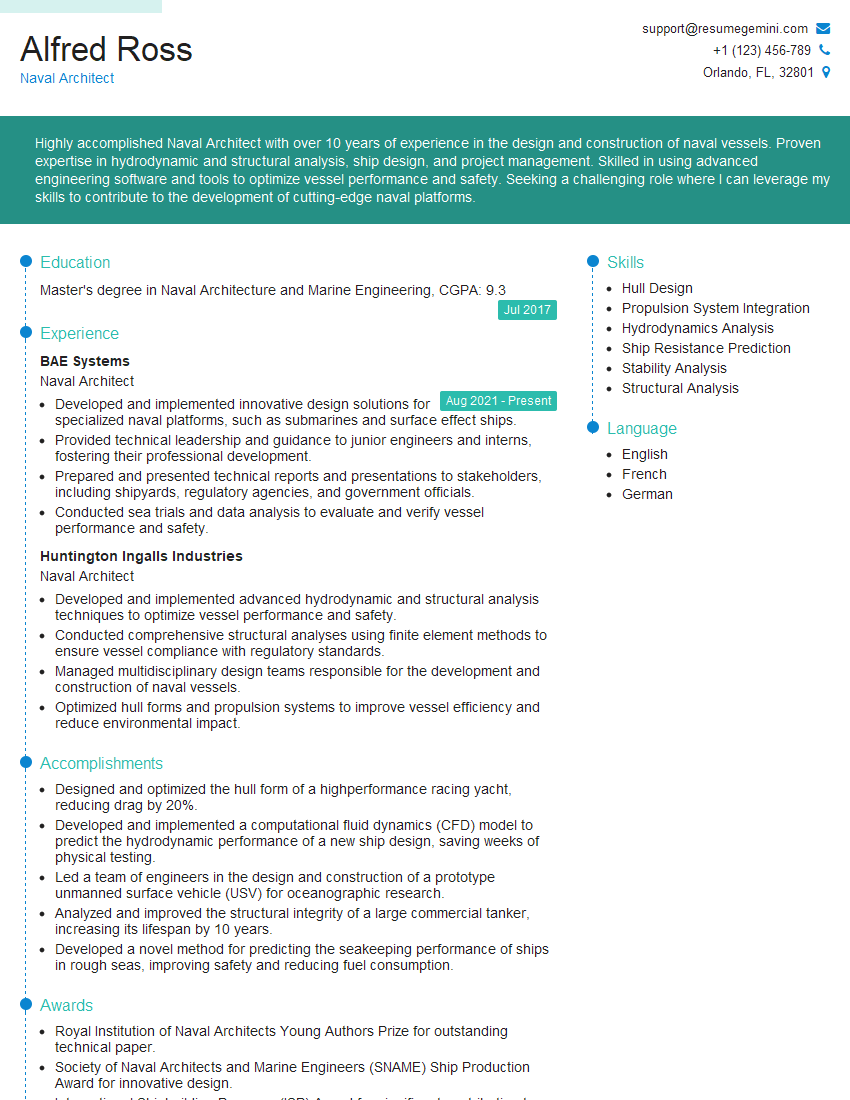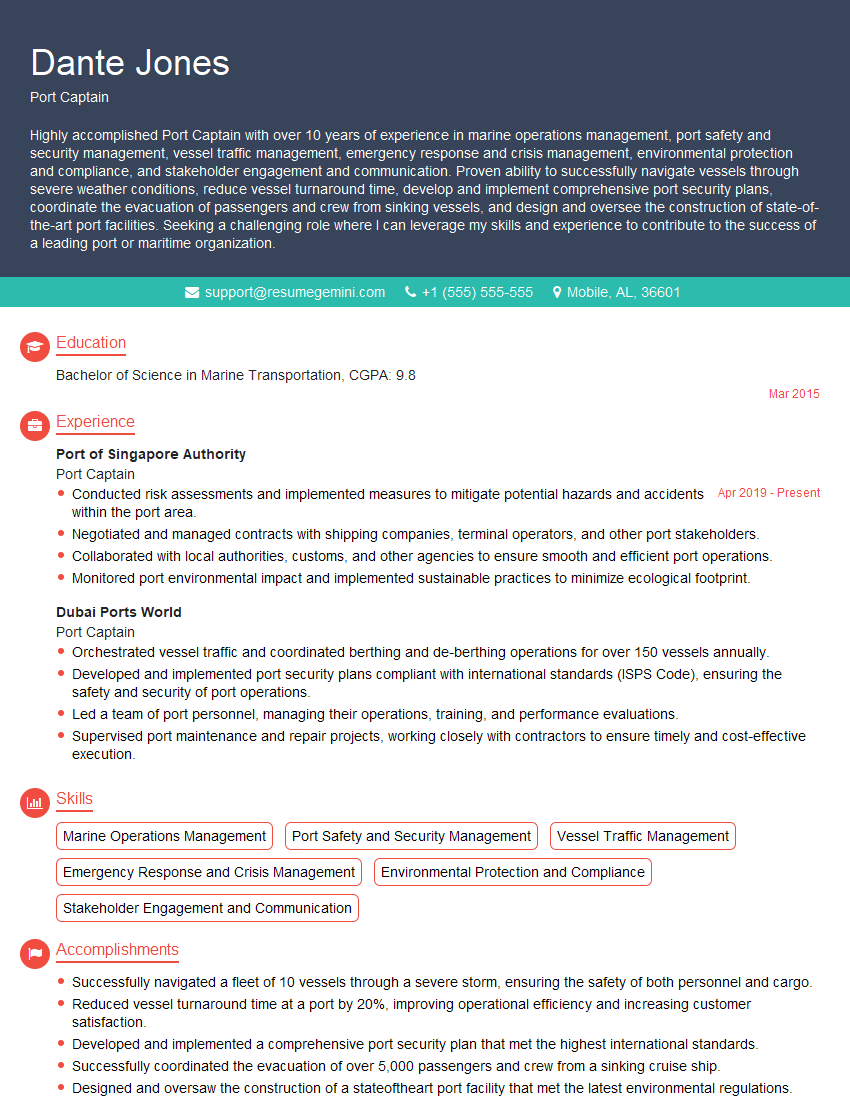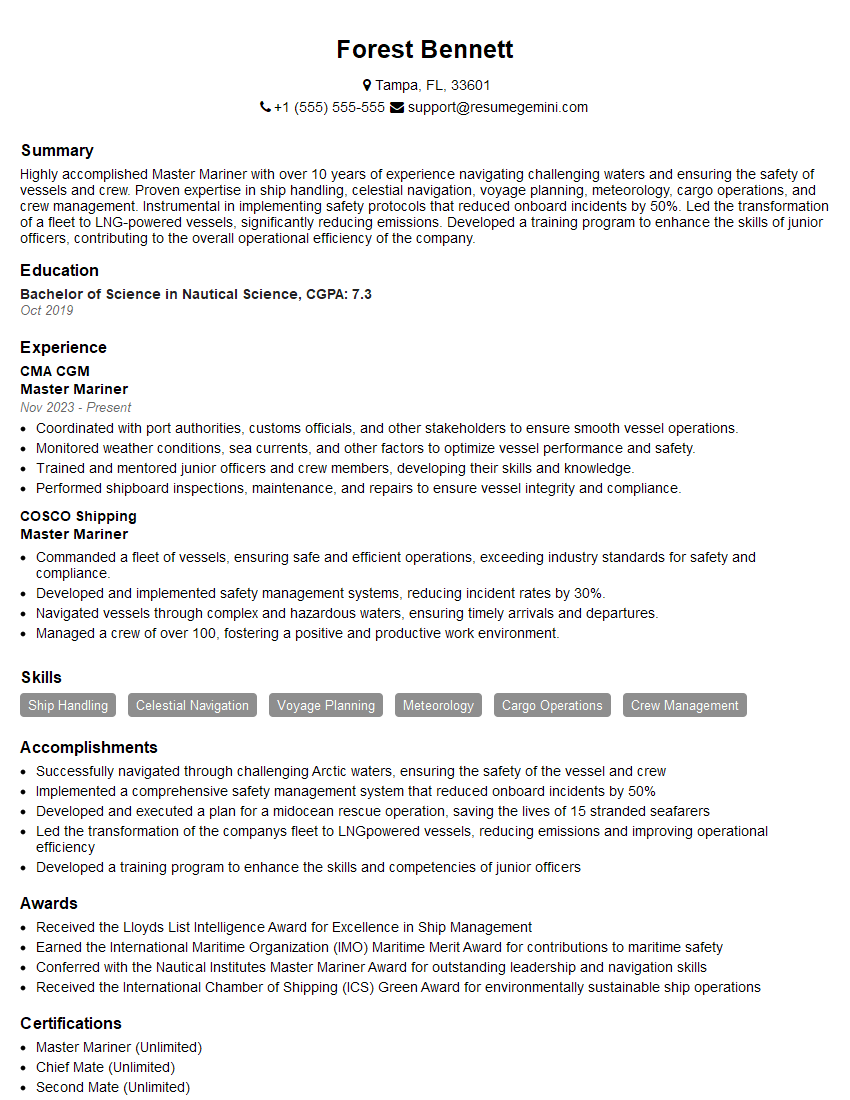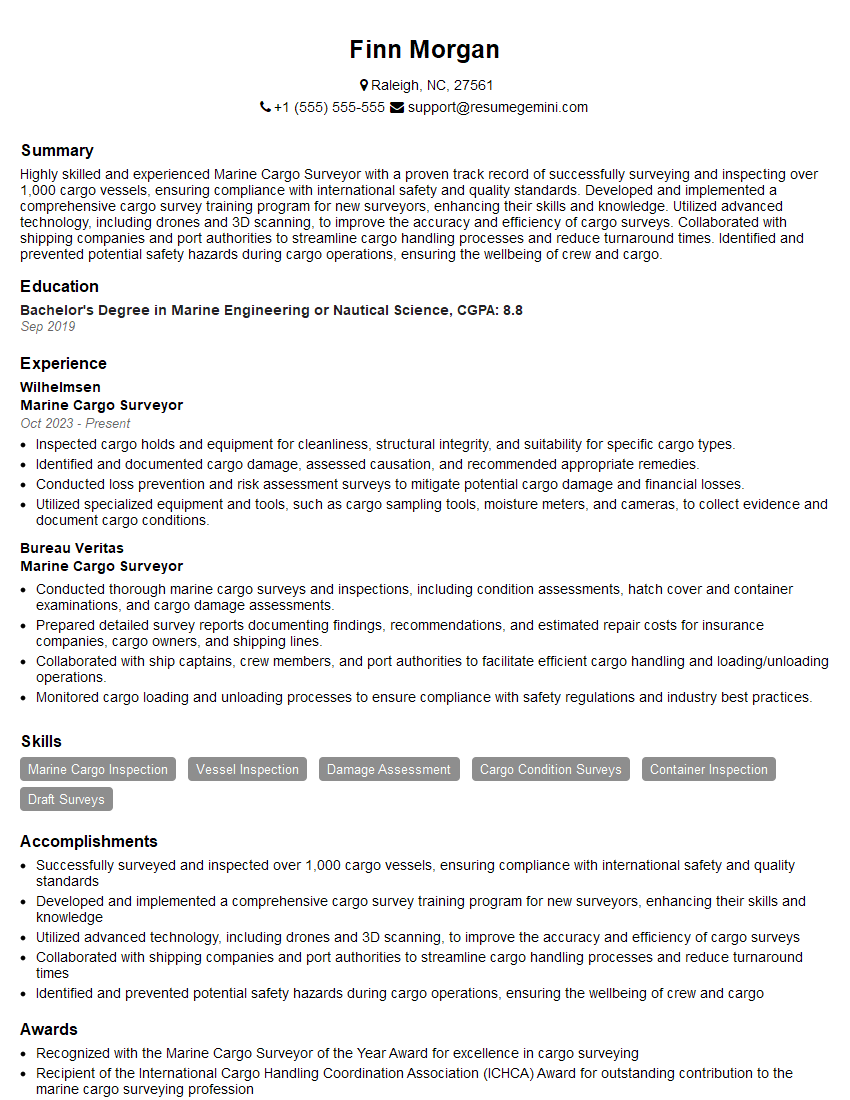The thought of an interview can be nerve-wracking, but the right preparation can make all the difference. Explore this comprehensive guide to Lloyd’s Open Form Salvage Agreement interview questions and gain the confidence you need to showcase your abilities and secure the role.
Questions Asked in Lloyd’s Open Form Salvage Agreement Interview
Q 1. Explain the key features of a Lloyd’s Open Form Salvage Agreement (LOFSA).
The Lloyd’s Open Form Salvage Agreement (LOFSA) is a standardized contract used internationally in maritime salvage operations. It’s a crucial tool because it provides a framework for quickly initiating salvage efforts without lengthy negotiations beforehand, vital in time-sensitive emergency situations. Key features include:
- Simplicity and Speed: LOFSA’s concise nature allows for immediate commencement of salvage operations without detailed pre-negotiation of fees. This is crucial in emergencies where delay can exacerbate losses.
- ‘No Cure, No Pay’: Salvors only receive payment if they successfully complete the salvage operation. This aligns the interests of salvors and owners, incentivizing effective and efficient salvage.
- Arbitration Clause: Disputes regarding the salvage award are typically resolved through arbitration, a more efficient and less costly process than litigation.
- Salvor’s Lien: The LOFSA grants the salvor a maritime lien on the salvaged property, ensuring they can recover their costs and remuneration even if the owner disputes the award.
- Open-Ended Nature: The agreement is open-ended, meaning the specific terms of remuneration are determined only after the salvage is completed and the value of the services is assessed.
Imagine a ship stranded in a storm – LOFSA allows a nearby tugboat to immediately start rescue efforts without lengthy contract negotiations, maximizing the chances of a successful salvage.
Q 2. What are the benefits of using a LOFSA for both salvors and owners?
LOFSA benefits both salvors and owners significantly:
- For Salvors: LOFSA provides a quick and simple way to secure payment for their services. The ‘no cure, no pay’ aspect may seem risky, but the salvor’s lien protects their interests. The standardized nature reduces legal complexities. The arbitration clause offers a straightforward path to resolving any disputes.
- For Owners: LOFSA enables rapid response to emergencies, minimizing further damage and potential losses. The ‘no cure, no pay’ provision ensures they only pay if the salvage is successful. The standard form minimizes negotiation time in high-pressure situations.
Consider a scenario where a cargo ship is sinking: LOFSA allows the owner to quickly engage a salvor without worrying about complex upfront contracts, while the salvor knows their efforts will be rewarded proportionally to the success of their work.
Q 3. Describe the process of invoking a LOFSA.
Invoking a LOFSA is typically a swift process. It usually involves:
- Initial Contact: The salvor contacts the owner (or their representative, e.g., the insurer) to offer salvage services.
- Agreement to Proceed: The owner or their representative agrees to the terms of the LOFSA, often implicitly by accepting the salvor’s services. This often happens in time-critical scenarios where an immediate response is essential.
- Signing the LOFSA: In principle, the LOFSA is signed after the salvage, but the practical reality is acceptance of the service constitutes acceptance of the LOFSA terms. The signed copy is typically exchanged at a later stage.
- Salvage Operations: The salvor undertakes the salvage operation.
The key here is the immediacy of the agreement. Think of it like an ambulance arriving at an accident scene: immediate action is paramount, and the details of payment are handled later.
Q 4. What constitutes ‘services rendered’ under a LOFSA?
‘Services rendered’ under a LOFSA encompasses all actions taken by the salvor to preserve and recover the vessel or its cargo. This includes:
- Direct salvage efforts: Refloating a vessel, extinguishing fires, preventing further damage.
- Protective measures: Securing the vessel, removing hazards, preventing pollution.
- Transportation of the salvaged property: Towing the vessel to a safe location.
- Other related activities: Such as managing the vessel’s cargo, arranging repairs, or managing associated risks.
For example, if a salvor pumps out water from a sinking vessel, that’s a service rendered. If they also tow the vessel to port, that is also included within the services rendered under the LOFSA.
Q 5. How is the salvage award determined under a LOFSA?
The salvage award under a LOFSA is determined through arbitration, typically following a detailed assessment of several factors. The arbitrator will consider:
- Value of the property saved: The market value of the vessel and cargo successfully salvaged.
- Skill and effort of the salvor: The complexity and risk involved in the salvage operation, and the salvor’s expertise and efficiency.
- Degree of success: The extent to which the salvor succeeded in achieving their objectives.
- Risk undertaken by the salvor: The potential dangers faced by the salvor and their equipment during the operation.
- Market rates for salvage services: The prevailing market rates for similar salvage operations.
The process involves presenting evidence, expert testimony, and potentially site inspections to determine a fair and just award which takes all relevant circumstances into consideration.
Q 6. Explain the concept of ‘no cure, no pay’ in relation to LOFSA.
‘No cure, no pay’ is a fundamental principle of LOFSA. It means the salvor only receives payment if the salvage operation is successful in achieving its objectives. If the salvage attempt fails, the salvor receives nothing, apart from any pre-agreed expenses. This is a key incentive to only undertake salvage actions only when there is a high probability of success.
Think of it as a performance-based contract. A contractor gets paid only if the project is successfully completed, thus focusing efforts on maximum efficiency and successful completion. If the salvage fails, no payment is owed.
Q 7. What are the implications of the ‘salvor’s lien’?
The salvor’s lien is a crucial legal right granted under LOFSA. It gives the salvor a proprietary claim on the salvaged property, acting as security for their payment. This lien allows the salvor to retain possession of the salvaged property until their award is paid, even if the owner disputes the amount. It’s a strong legal tool securing the salvor’s remuneration. This ensures the salvor is not left unpaid even if the owner refuses to pay.
Imagine a scenario where the owner refuses to pay; the salvor can use the lien to hold onto the salvaged vessel or cargo until they receive what they are rightfully owed. This secures payment for valuable services rendered.
Q 8. How does a LOFSA address potential conflicts of interest?
The Lloyd’s Open Form Salvage Agreement (LOFSA) cleverly mitigates potential conflicts of interest through its structure and principles. The core idea is to incentivize the salvor to act in the best interests of all parties involved – the owners of the salved property – rather than just prioritizing their own gain. This is achieved primarily by:
- Transparency: The agreement is open and accessible, meaning all parties can review the terms. This prevents hidden clauses or preferential treatment.
- Independent Valuation: The salvage award is determined after the successful completion of the salvage operation, based on an independent valuation of the salved property. This prevents the salvor from inflating the value to maximize their reward.
- No Cure, No Pay: A fundamental principle is that if the salvage attempt is unsuccessful, the salvor receives no payment. This strongly encourages the salvor to only undertake feasible and effective salvage operations.
- Arbitration: Any disputes arising from the LOFSA are typically resolved through arbitration, which provides a neutral and expert-led process, ensuring fair resolution.
Imagine a situation where a ship is in distress. A salvor could be tempted to prioritize quick, less effective salvage to get paid quickly. LOFSA minimizes this by tying the reward directly to the successful value enhancement of the property and employing an independent valuation process.
Q 9. Describe the role of the salvage master under a LOFSA.
The Salvage Master is the linchpin of the salvage operation under a LOFSA. They are appointed by the salvor and act as the on-site manager and decision-maker, responsible for the overall direction and execution of the salvage. Their role is crucial and involves:
- Safety and Security: Overseeing the safety of the salvage crew and ensuring the protection of the salved property and the environment.
- Strategic Decisions: Making vital on-the-spot decisions regarding the salvage tactics and procedures, often under challenging conditions.
- Communication: Maintaining open communication with all stakeholders, including the owners of the salved property, the insurers, and the port authorities.
- Documentation: Meticulously documenting all aspects of the salvage operation, including expenses, progress, and any unforeseen circumstances.
- Cost Management: Acting as the custodian of the salvage expenses and providing records for subsequent settlements.
Think of the Salvage Master as the captain of a salvage operation, responsible for its success and the safety of the entire team.
Q 10. What are the common clauses found within a LOFSA?
While the precise wording might vary, typical clauses in a LOFSA include:
- No Cure, No Pay: The fundamental clause stipulating that the salvor is only entitled to a reward if the salvage operation is successful.
- Definition of Salvage Operations: A clear description of the services covered by the agreement.
- Salvor’s Responsibilities: The duties and obligations expected from the salvor during and after the salvage.
- Security for Costs: A clause addressing how the salvor’s initial expenses will be secured.
- Valuation of Salved Property: The process for determining the value of the salved property to calculate the salvage award.
- Dispute Resolution: Typically involves arbitration to settle disagreements.
- Governing Law: Specifies the jurisdiction governing the agreement.
These clauses collectively establish a transparent and well-defined framework that protects all parties involved.
Q 11. How does a LOFSA differ from other salvage contracts?
LOFSA stands apart from other salvage contracts primarily because of its ‘no cure, no pay’ principle and its open, readily accessible nature. Traditional salvage contracts often involve protracted negotiations before the commencement of operations, potentially delaying urgent salvage efforts. LOFSA is a standard form contract offering immediacy and clarity. Here’s a comparison:
- Negotiated Salvage Contracts: More flexible but time-consuming and prone to disputes over the terms and the final salvage award.
- LOFSA: Pre-defined terms, facilitating prompt action, but with less flexibility in negotiations.
LOFSA essentially streamlines the process, allowing salvage operations to begin swiftly in emergency situations. The open nature means the terms are transparent to all parties involved.
Q 12. Explain the concept of ‘general average’ and its relevance to LOFSA.
General average is a principle of maritime law where losses incurred to save a ship and its cargo from a common peril are shared proportionately among all stakeholders – the ship owner, cargo owners, and even freight owners. In the context of a LOFSA, if a general average act is necessary to save the vessel and its cargo (for example, jettisoning cargo during a storm), the salvage award will consider this. The salvor’s expenses are part of the general average losses which are eventually distributed fairly among all stakeholders. The LOFSA doesn’t dictate general average itself but operates within its framework.
For example: if cargo is jettisoned to save a vessel during a storm, the loss would be distributed proportionately amongst the cargo owner, ship owner etc and the salvor’s expenses for the subsequent salvage might also be included in this general average distribution.
Q 13. What are the legal implications of failing to comply with a LOFSA?
Failure to comply with the terms of a LOFSA can have significant legal implications. Breaches can lead to:
- Legal Disputes: Disputes are typically resolved through arbitration as specified within the contract. Failure to comply could result in unfavorable arbitration rulings.
- Financial Penalties: Depending on the nature and severity of the breach, financial penalties could be imposed on the breaching party.
- Reputational Damage: For salvors or vessel owners, non-compliance can harm their reputation within the maritime industry.
- Criminal Charges: In certain cases, serious breaches, particularly concerning safety or environmental damage, could result in criminal prosecution.
It’s crucial that all parties understand and adhere to the terms of the LOFSA to avoid potentially serious consequences.
Q 14. Describe how the value of the salved property is assessed.
The valuation of the salved property under a LOFSA is a critical aspect, determining the final salvage award. Typically, this involves:
- Independent Valuation: An independent valuer, often a marine surveyor, is appointed to assess the value of the salved property after the successful salvage operation. This ensures impartiality and prevents conflicts of interest.
- Market Value: The valuation is based on the market value of the property as it stands after salvage, considering any damage or loss. This is not necessarily the pre-incident value.
- Agreed Valuation: In some instances, the parties involved might agree on a pre-determined valuation method or approach.
- Documentation: The valuer provides a detailed report that serves as the basis for calculating the salvage award.
The valuation process is designed to be fair and objective, with clear criteria to avoid bias and ensure a just settlement for both the salvor and the owners of the salved property.
Q 15. What are some common disputes that arise under LOFSA and how are they resolved?
Disputes under the Lloyd’s Open Form Salvage Agreement (LOFSA) are unfortunately common, given the often chaotic and high-stakes nature of salvage operations. These disputes frequently center around the valuation of the salved property, the calculation of the salvage award, and the apportionment of salvage expenses. For instance, disagreements can arise regarding the condition of the vessel or cargo before and after the salvage operation, leading to differing assessments of the value saved. Another frequent point of contention is the extent to which the salvors’ efforts actually contributed to the successful salvage.
Resolution typically begins with negotiation between the salvors and the owners. If this fails, the agreement provides for binding arbitration, often conducted under the rules of a reputable arbitral institution like the London Maritime Arbitrators Association (LMAA). Arbitration offers a more formal, structured process to determine the salvage award, considering expert witness testimony and evidence presented by both sides. Court proceedings are a last resort, generally only pursued if there’s a challenge to the arbitral award itself, and even then, challenging an arbitration award is a high bar to clear.
- Valuation Disputes: Disagreements over the pre- and post-salvage value of the property.
- Apportionment of Expenses: Disputes over the allocation of costs between salvors and owners.
- Contribution of Salvors: Arguments over the salvors’ actual role in the successful salvage operation.
Career Expert Tips:
- Ace those interviews! Prepare effectively by reviewing the Top 50 Most Common Interview Questions on ResumeGemini.
- Navigate your job search with confidence! Explore a wide range of Career Tips on ResumeGemini. Learn about common challenges and recommendations to overcome them.
- Craft the perfect resume! Master the Art of Resume Writing with ResumeGemini’s guide. Showcase your unique qualifications and achievements effectively.
- Don’t miss out on holiday savings! Build your dream resume with ResumeGemini’s ATS optimized templates.
Q 16. Discuss the role of arbitration in resolving LOFSA disputes.
Arbitration plays a pivotal role in resolving LOFSA disputes. It’s the primary mechanism stipulated within the agreement itself for resolving disagreements between the salvors and the owners of the salved property. The LOFSA explicitly provides for arbitration, typically under the rules of the LMAA, which ensures a fair and efficient process. This avoids protracted and expensive court litigation, a significant benefit given the urgency often associated with salvage matters. The LMAA’s expertise in maritime law and salvage cases provides a specialized and respected forum for the resolution of such complex matters.
The arbitration process usually involves the appointment of one or three arbitrators, often with specialized experience in salvage and maritime law. Each party presents its case, including evidence and expert testimony. The arbitrators then consider the evidence and make a binding award, determining the amount of salvage remuneration due to the salvors. This award is generally final and enforceable, unless successfully challenged in court under very limited grounds, such as evident bias or serious procedural irregularities.
Q 17. How does currency fluctuation affect salvage awards under a LOFSA?
Currency fluctuations can significantly impact salvage awards under LOFSA. The agreement typically specifies a currency for the award (often USD), but the actual costs incurred by the salvors might be in different currencies. If the currency of the salvage expenses depreciates against the award currency, the salvors will receive a smaller real amount. Conversely, if it appreciates, they will receive a larger amount. This presents a considerable risk for both parties. For example, if the salvage operation costs are incurred primarily in Euros, but the award is in US Dollars, the fluctuating exchange rate between the Euro and the Dollar between the commencement of the salvage operation and the award could significantly impact the salvors’ final remuneration.
To mitigate this risk, various strategies are used. These might include hedging currency risk through financial instruments, agreeing on a fixed exchange rate in advance, or explicitly addressing currency fluctuations in the arbitration process. The LMAA guidelines on arbitration provide a framework to address these situations in a fair and transparent manner.
Q 18. Explain the concept of ‘special compensation’ in LOFSA.
‘Special compensation’ under LOFSA is an award granted to salvors beyond the standard salvage award calculated based on the value saved. It’s awarded in exceptional circumstances where the salvors demonstrate exceptional skill, bravery, or risk-taking that goes beyond the ordinary duties expected in a salvage operation. This concept is meant to incentivize salvors to go above and beyond in particularly hazardous or challenging situations, even when the potential financial gain might otherwise be limited.
For example, if a salvage operation involves extreme weather conditions, significant risks to life, or unusual technical challenges, and the salvors successfully overcome these obstacles, they might be entitled to special compensation in addition to the standard salvage award. The amount of special compensation is determined by the arbitrators, taking into account the exceptional circumstances of the case. This encourages heroic and exceptionally skillful responses in perilous salvage undertakings.
Q 19. How are salvage expenses accounted for under a LOFSA?
Salvage expenses under LOFSA are meticulously accounted for and are crucial in determining the net salvage award. Salvors must keep detailed and accurate records of all expenses incurred during the salvage operation. This includes fuel, crew wages, equipment repair or replacement, towage costs, and any other expenses directly related to the salvage effort. Supporting documentation, such as invoices and receipts, is essential.
The arbitrators will scrutinize these expenses to ensure their legitimacy and reasonableness. Unreasonable or inflated expenses might be disallowed. Once the expenses are verified, they are deducted from the gross salvage award, based on the value saved, to arrive at the net salvage award payable to the salvors. Transparency and accurate record-keeping are critical for the salvors to receive a fair net award. Any disputes concerning expenses usually are determined by the arbitrators.
Q 20. What are the ethical considerations for those involved in salvage operations under LOFSA?
Ethical considerations are paramount in salvage operations under LOFSA. Salvors have a duty to act honestly and responsibly throughout the entire process. This includes accurately reporting the condition of the salved property, honestly accounting for expenses, and acting in good faith during negotiations and arbitration. Any attempt to inflate expenses, misrepresent the situation, or engage in deceptive practices can severely jeopardize the salvors’ credibility and reputation, potentially leading to penalties or the rejection of their claim.
Furthermore, the safety of the salvors and the environment must be prioritized. Ethical salvors will take all necessary precautions to protect both their personnel and the marine environment during the operation. Ignoring safety protocols or environmental concerns can have serious legal and ethical implications, with potential penalties far outweighing any financial gain. Maintaining the highest ethical standards is crucial for building trust and ensuring the long-term sustainability of the salvage industry.
Q 21. How do environmental concerns influence salvage operations under LOFSA?
Environmental concerns are increasingly influencing salvage operations under LOFSA. The potential for environmental damage from a wrecked vessel or its cargo is significant, with oil spills being a major risk. Salvage operations must be conducted in a way that minimizes environmental impact. This requires careful planning, the use of environmentally friendly techniques, and compliance with relevant environmental regulations and international conventions like MARPOL.
The salvors have a responsibility to prevent or mitigate environmental damage. Failing to do so could expose them to significant fines and legal liabilities, potentially far exceeding any salvage award. Arbitrators will consider environmental concerns when determining the salvage award, potentially reducing the award if the salvors have caused or failed to prevent environmental damage. Therefore, sustainable and environmentally sound salvage practices are now integral to successful and ethically responsible operations under LOFSA.
Q 22. What are the limitations of LOFSA?
The Lloyd’s Open Form Salvage Agreement (LOFSA) is a powerful tool, but it’s not without its limitations. Primarily, it’s a no cure, no pay agreement. This means the salvor only receives payment if the salvage operation is successful. If the vessel or cargo is a total loss, or if the salvage operation fails, the salvor receives nothing, despite potentially incurring significant expenses. Another limitation is the potential for disputes regarding the value of the salved property and the appropriate salvage award. The open-ended nature of the agreement can lead to complex negotiations and even litigation if the parties can’t reach a mutually agreeable settlement. Finally, the agreement’s broad scope can create uncertainty regarding liability for various aspects of the salvage operation, including damage caused during the salvage itself. Think of it like a high-stakes gamble; the potential reward is enormous, but the risk of receiving no reward despite significant effort is also substantial.
Q 23. Describe a scenario where a LOFSA would be inappropriate.
LOFSA would be inappropriate in scenarios where a fixed-price contract is more suitable. For instance, if the salvage operation is relatively straightforward and the risks are well-defined, a fixed price contract offers more certainty. Imagine a situation where a grounded yacht in shallow water needs to be refloated – a local salvage company might offer a fixed fee for the job. Using LOFSA in this situation would be overkill and unnecessarily risky for the salvor who might have to bear unexpected costs with no guarantee of payment. Similarly, if the owner is unwilling to take on the risk of a large, potentially unpredictable salvage reward, then a fixed-price contract would be a better fit. A company with limited financial resources would prefer the predictable cost of a fixed-price contract over the risk of LOFSA.
Q 24. How does insurance affect the application and outcome of LOFSA?
Insurance plays a crucial role. The insured party (typically the vessel owner or cargo owner) will often have Hull and Machinery (H&M) insurance or Cargo insurance. These policies will usually cover salvage expenses, and the insurer will often be involved in negotiating the salvage award under LOFSA. The insurer will want to minimize their payout, so they may challenge the salvor’s claim and try to reduce the agreed salvage award. The existence and terms of insurance policies significantly impact negotiations under LOFSA because the ultimate financial responsibility rests with the insurer. If a vessel is uninsured, the owner bears the full financial risk and would be entirely responsible for the salvage award, which could potentially make agreeing to LOFSA less attractive.
Q 25. What are the recent developments or case laws that have impacted LOFSA?
Recent developments and case law surrounding LOFSA often revolve around interpretations of the agreement’s clauses and the calculation of salvage awards. Courts have increasingly focused on ensuring fairness and transparency in the process. There’s a continuing debate around the appropriate apportionment of salvage awards, particularly in cases involving multiple salvors or complex salvage operations. Cases have highlighted the importance of thorough documentation to support claims and the need for clear communication between the salvor and the insured party. The exact details of recent case law are constantly evolving, so consultation with maritime legal experts is crucial for the latest updates. While I can’t discuss specifics of ongoing cases due to confidentiality, the general trend is toward greater clarity and better protection of all parties involved.
Q 26. Explain the differences between LOFSA and a fixed-price salvage contract.
The core difference lies in the payment structure. LOFSA is a no cure, no pay agreement where the salvor’s reward is a percentage of the salved property’s value, determined after the successful completion of the salvage operation. A fixed-price salvage contract, on the other hand, specifies a predetermined fee for the services rendered, regardless of the outcome. Think of it like this: LOFSA is like working on commission, where you earn a percentage of the sales you make; a fixed-price contract is like getting a fixed salary for the job, regardless of the amount you sell. This means in a fixed-price contract, the salvor bears the risk of unexpected costs, while under LOFSA, the owner/insurer bears the risk of a high salvage award.
Q 27. Discuss the role of documentation and record-keeping in salvage operations under LOFSA.
Documentation and record-keeping are absolutely paramount under LOFSA. Meticulous records of all aspects of the salvage operation are essential for supporting the salvor’s claim for a salvage award. This includes detailed logs of actions taken, expenses incurred (fuel, crew wages, equipment usage, etc.), photographs and videos documenting the condition of the vessel before, during, and after the salvage, and expert reports assessing damage and value. Maintaining clear and complete records minimizes the risk of disputes and strengthens the salvor’s negotiation position. Failure to keep accurate and comprehensive records can severely weaken a salvor’s claim, potentially resulting in a significantly reduced award or even no payment at all. Think of it as building a solid case – the more detailed and accurate your documentation, the stronger your case will be.
Q 28. What steps should be taken to secure and protect salved property under a LOFSA?
Securing and protecting salved property under LOFSA is critical to preserving its value and supporting the salvage claim. Immediate steps should focus on preventing further damage or deterioration. This might involve stabilizing the vessel, pumping out water, covering exposed cargo, or deploying security personnel. It’s essential to identify and safeguard any potential evidence relevant to the salvage operation. Detailed photographic and video documentation should be undertaken as soon as possible. The salvor should also secure appropriate storage for the salved property, ensuring its safety and preventing further loss. This might involve temporary storage facilities or moving the salved property to a secure location. Finally, the salvor should continuously monitor the condition of the salved property to prevent any further damage or loss. These precautions protect the salved property’s value, strengthening the salvor’s claim for a fair salvage award.
Key Topics to Learn for Lloyd’s Open Form Salvage Agreement Interview
- Understanding the Agreement’s Purpose: Grasp the core function of the Lloyd’s Open Form – securing and recovering property at sea while defining the responsibilities of salvors and owners.
- No Cure, No Pay Principle: Thoroughly understand the implications of this fundamental principle and its impact on the salvor’s compensation. Analyze scenarios where this principle might be challenged.
- Defining “Salvage”: Explore the legal definition of salvage and how it applies in various situations, including partial losses, total losses, and different types of vessels.
- Calculating Salvage Awards: Familiarize yourself with the factors considered when determining a fair salvage award, including the risk undertaken, the value of the property saved, and the skill and effort employed.
- Dispute Resolution Mechanisms: Understand the processes involved in resolving disputes arising from the agreement, such as arbitration and litigation. Explore the potential for different interpretations and outcomes.
- Legal and Maritime Conventions: Be aware of relevant international conventions and legislation impacting salvage operations and the interpretation of the Lloyd’s Open Form.
- Practical Application: Case Studies: Review real-world case studies to analyze how the Lloyd’s Open Form has been applied in different scenarios, highlighting both successful and unsuccessful outcomes.
- Ethical Considerations: Consider the ethical implications of salvage operations and the importance of acting in good faith and with due diligence.
Next Steps
Mastering the Lloyd’s Open Form Salvage Agreement is crucial for advancing your career in maritime law, insurance, and salvage operations. A strong understanding of this agreement demonstrates expertise and opens doors to exciting opportunities. To enhance your job prospects, creating a compelling and ATS-friendly resume is paramount. ResumeGemini is a trusted resource that can significantly assist you in building a professional and impactful resume. We provide examples of resumes tailored to highlight Lloyd’s Open Form Salvage Agreement expertise, allowing you to present your skills and experience effectively to potential employers.
Explore more articles
Users Rating of Our Blogs
Share Your Experience
We value your feedback! Please rate our content and share your thoughts (optional).
What Readers Say About Our Blog
Hello,
We found issues with your domain’s email setup that may be sending your messages to spam or blocking them completely. InboxShield Mini shows you how to fix it in minutes — no tech skills required.
Scan your domain now for details: https://inboxshield-mini.com/
— Adam @ InboxShield Mini
Reply STOP to unsubscribe
Hi, are you owner of interviewgemini.com? What if I told you I could help you find extra time in your schedule, reconnect with leads you didn’t even realize you missed, and bring in more “I want to work with you” conversations, without increasing your ad spend or hiring a full-time employee?
All with a flexible, budget-friendly service that could easily pay for itself. Sounds good?
Would it be nice to jump on a quick 10-minute call so I can show you exactly how we make this work?
Best,
Hapei
Marketing Director
Hey, I know you’re the owner of interviewgemini.com. I’ll be quick.
Fundraising for your business is tough and time-consuming. We make it easier by guaranteeing two private investor meetings each month, for six months. No demos, no pitch events – just direct introductions to active investors matched to your startup.
If youR17;re raising, this could help you build real momentum. Want me to send more info?
Hi, I represent an SEO company that specialises in getting you AI citations and higher rankings on Google. I’d like to offer you a 100% free SEO audit for your website. Would you be interested?
Hi, I represent an SEO company that specialises in getting you AI citations and higher rankings on Google. I’d like to offer you a 100% free SEO audit for your website. Would you be interested?
good
